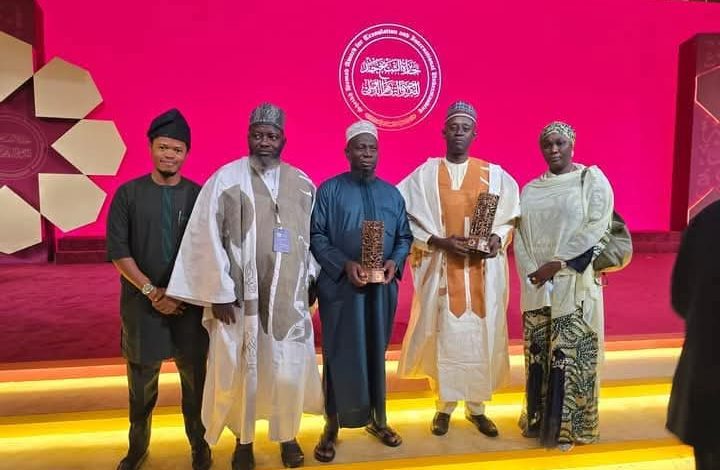Dr. Sharaf: Backlash As Islamic Scholar Who Opposed Photography Spotted Taking Pictures With Clerics

A renowned Nigerian Islamic scholar, Dr. Sharaf-Din Raji Gbadebo, widely known for his staunch opposition to photography, has found himself at the center of a heated controversy after images of him posing with fellow clerics surfaced online.
Osun Defender reports that the photos, allegedly taken during the presentation of the prestigious Sheikh Hamad Award for Translation and International Understanding in Qatar, have sparked widespread debate among his followers and critics alike.
Dr. Sharaf, celebrated for his scholarly contributions, recently gained international recognition for his translation of Attainment of the Purpose in the Hadiths of Rules from Arabic to Yoruba.
The Noble Wisdom International Academy, led by its director Ibrahim Awayewaserere, lauded his achievement with a heartfelt congratulatory message. While his recognition has drawn applause from many, the emerging images have ignited intense scrutiny of his earlier fatwas condemning photography as un-Islamic.
Criticism from Followers and Critics
In a voice note circulating on social media, a female critic expressed dismay at seeing Dr. Sharaf in front of a camera, stating that his staunch condemnation of photography had influenced many to adopt the belief that snapping pictures lacked Islamic validity.
“To see him standing in front of a camera is heartbreaking,” she said.
Online reactions were divided. Ridwan Sulaiman Odekeye, commenting on the situation, accused Dr. Sharaf’s followers of “hero-worshipping” and blind loyalty. “Rather than addressing the contradiction, his fans attacked those who brought the matter to light,” Ridwan lamented.
He questioned why many supporters refused to admit the disparity between Dr. Sharaf’s teachings and actions.
Ustadh Sulaiman Azeez, a respected voice in Islamic discourse, expressed disappointment over the lack of clarity from Dr. Sharaf.
According to him, Dr. Sharaf failed to provide a sufficient explanation for the images when questioned, instead resorting to dismissive remarks like “Abi o gbadun” (loosely translated as “Did I enjoy it?”). “You can’t be harsh in your rulings and expect leniency when you err,” Azeez remarked, adding that the lack of accountability left many confused.
READ ALSO: Sheikh Ajani Bello: Biography, Cause Of Death, Age, Family, Education, Net Worth, More

A Test of Loyalty or Hypocrisy?
The issue has also reignited debates about consistency among Islamic scholars. Critics of Dr. Sharaf compared him to other respected clerics, such as Dr. Asra’, Shaykh Imran Eleha, and Shaykh Dikrullah Shafi’i, known for their balanced approach and consistency between words and actions.
Some observers argued that scholars like Dr. Sharaf, who maintain hardline stances, should expect harsh criticism when their actions appear contradictory.
One social media user, Sulaiman Abdussalam, suggested that financial incentives tied to the award might have influenced Dr. Sharaf’s actions.
“Why wouldn’t it be a necessity when $100,000 is involved?” he wrote, calling on the scholar to remain firm in his beliefs if truly sincere.
Another commenter, Olawale Idowu, argued that the sin of taking the picture rests on the photographer, not Dr. Sharaf, as he may not have consented to the act.
Mixed Reactions Persist
While some continue to defend Dr. Sharaf, others are demanding greater accountability. Uthman Sulykhah dismissed the criticisms, accusing some individuals of spending time nitpicking the mistakes of scholars for online debates.
Khalifah Ibrahim, on the other hand, described the situation as a reflection of deeper issues within the community, noting that “brainwashing” had prevented many from questioning inconsistencies in leadership.
The controversy surrounding Dr. Sharaf underscores the challenges Islamic scholars face in balancing doctrinal purity with the realities of contemporary society.
As the backlash grows, many await a more comprehensive response from Dr. Sharaf to address the concerns of his followers and critics alike.

Sodiq Lawal is a passionate and dedicated journalist with a knack for uncovering captivating stories in the bustling metropolis of Osun State and Nigeria at large. He has a versatile reporting style, covering a wide range of topics, from politics , campus, and social issues to arts and culture, seeking impact in all facets of the society.









